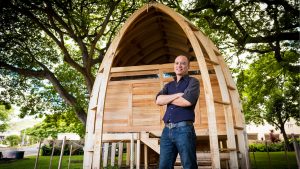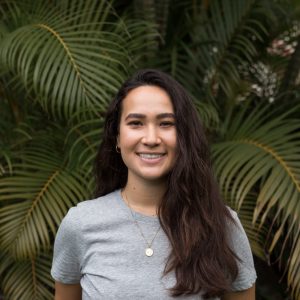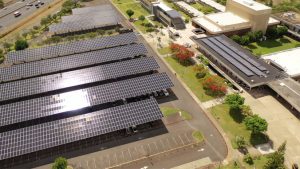‘Worry and hope’: Producing students to save the world
Posted on Nov 29, 2021 in Capitol Connection, Featured, Main“How many wake-up calls do we need? The challenge is to save ourselves from ourselves.” — UH system student
“Every college wants to graduate students who change the world, but let the UH system be the college that graduates students who save the world.” — Rebecca Tang, Kapi‘olani CC sustainability certificate graduate
“Worry and hope. Turning awareness into action.” Those were some of the student concerns UH sustainability director Matthew Lynch presented to the UH Board of Regents from a systemwide 2019 focus group study and campus-wide survey. The study showed that 96% of students across the UH system were “concerned” or “very concerned” about climate change and were looking for ways to take action. As one freshman said, “Some days when the news is mostly bad, it makes you feel worse. But other days you see someone making a small change and you think, I can do something. Just having a little bit of hope can overpower the doubts.”
Lynch and faculty and staff on the 10 campuses want to offer that hope across four areas of sustainability: curriculum, operations, research and community/cultural engagement. “Providing a pathway to a degree, to a better job, is no longer enough,” he maintained. Instead of a “green workforce,” he said we need an “infusion of sustainability literacy and competency across all of our economic sectors.” The campuses currently offer interdisciplinary sustainability certificates and degrees, and several have already reached “net-zero” in energy efficiency through on-site PV systems and other measures.
What does he see as the value of world summits like COP26? Besides the public commitments being made by states and nations, he said, “One benefit is being able to connect with other island societies, to share what’s happening on the frontlines of climate change. Conferences like this also provide a way to share ideas and resources, to build international relationships and to provide opportunities for our youth to shape their own futures.”
Lynch’s own journey took him from a 10-year career in banking and finance to community-building and regenerative agriculture. Along the way, he discovered a deeper set of values. “The truth is that we, as people, are not separate or apart from nature,” he said. “The fundamental work is to heal that divide between human and non-human life that keep us disconnected along political, racial, social and cultural divisions. We have to find ways to heal our disconnections.”
One critical leverage point, he said, is in the way we measure “progress” — not just in terms of GDP (Gross Domestic Product) or Total Visitor Numbers but progress as it relates to the health and well-being of our whole community. “I believe that a regenerative tourism economy is possible, if we devote the resources needed to protect our water quality, reduce our carbon emissions and repair and regenerate our natural resources,” Lynch said. “I think island people get it. Our small team’s role at the university is to help strengthen the many existing campus sustainability initiatives already under way, so the university as a whole can become a better partner to Hawai‘i’s people and places.” For more details, visit the UH Office of Sustainability at https://www.hawaii.edu/sustainability/.


